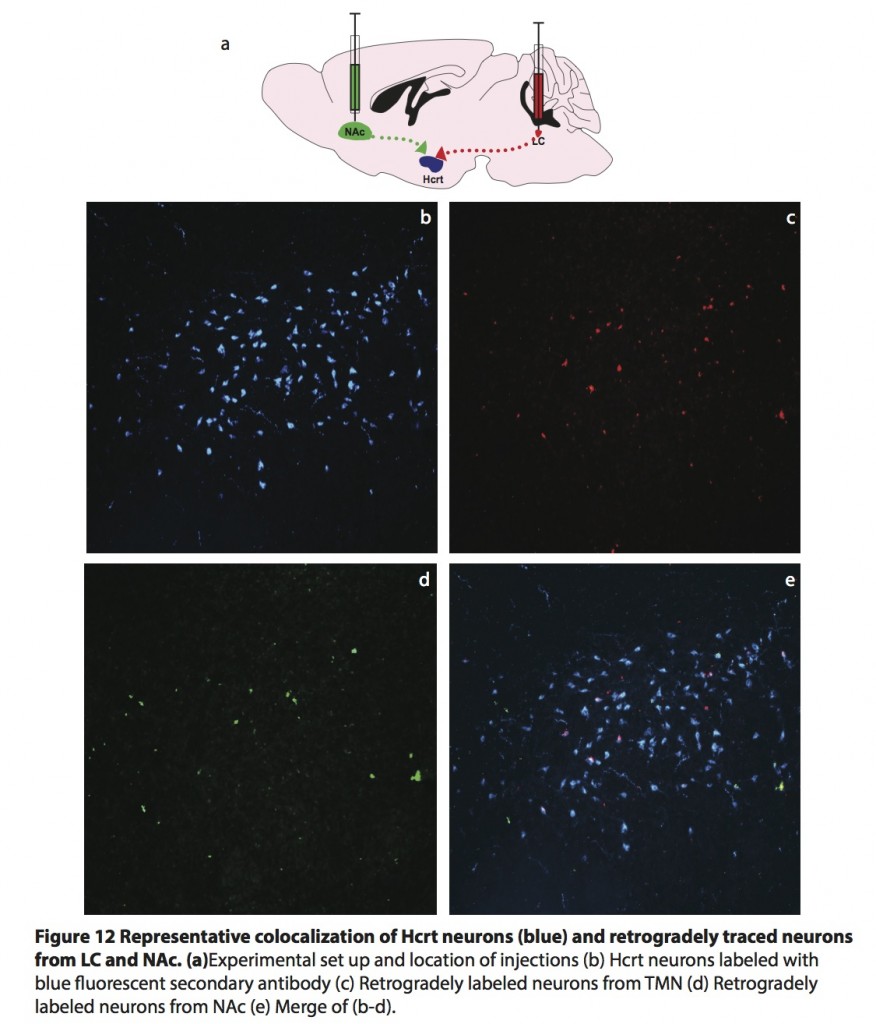By Katie Costantini ’16
Manasi Iyer is a biology major planning to pursue her PhD in Neuroscience. Here, she talks about her thesis, her love of lab work, and her interests for the future.
KC: Can you give a brief description of your research?
MI: I am working with Professor Matt Carter. Broadly, his research looks at the brain and behavior, and he uses this tool called optogenetics, which you can use to turn on specific neurons. You are able to see in real time how you can actually cause a behavior, which is really cool. So basically, I was looking at this neuropeptide called Hypocretin. Hypocretin has been implicated in both arousal and addiction behaviors in rodent models. My project was to determine if there are two discrete populations of Hypocretin neurons that control these two different types of behaviors: addiction and arousal. I would inject “red” into the arousal area and “green” into the addiction areas of the brain, so a double injection per mouse. To analyze this, I would look at overlap of the red and green “dots” to see if they physically overlapped in the Hypocretin field of the area of the brain called the hypothalamus, and I could see if they were separated into different populations.

KC: What got you interested in doing a neuroscience thesis?
MI: I came into college knowing that I wanted to do a PhD in neuroscience. Well actually, okay… back up. I wanted to be a history major and I knew I wanted to do a PhD. So I checked out the history major and I hated it. I took Bio 101 and I took Neuroscience 201, and I really liked neuroscience. I started doing work in Professor Zimmerberg’s lab, and she is in the neuroscience department. I really liked working with rodents. Then I went abroad and when I came back I realized that I wanted to apply to neuroscience PhD programs. Professor Zimmerberg was going on sabbatical and I had to think long and hard. Do I really want to do a thesis? I don’t have the academic advisors that I had been thinking all along that I would get to work with.
I told myself that if I wanted to go to graduate school, doing a thesis would be a really fulfilling experience. I love being in labs. And I think it’s the only way to do good science. You have to get your hands dirty. I got really lucky. Professor Williams told me about Matt’s work and I was really excited. Of course I wanted to work in that lab. I chatted with him on Skype and I knew it was going to be fine and that is was a good place for me to be. So really I started off a history major and I think I slowly fell in love with neuroscience. This is the area I want to go to graduate school in, so I decided to do a thesis.
KC: How did you pick your topic? Was it based on Matt’s previous work?
MI: So I think this is a big secret in the sciences, but obviously the Professors will always ask you to design the project and ask if you have any ideas. I did have an idea, but it wasn’t feasible. So, Hypocretin was actually discovered in Matt’s PhD lab. His dissertation advisor was one the people to discover Hypocretin. So Matt did his dissertation on Hypocretin and my project was basically a follow up project. Matt did a lot of behavioral work looking at this one specific brain region that is a down stream target and how it modulates arousal. So I am doing a follow anatomical study on Hypocretin in general.
KC: Do you think you want to continue in this area of research in graduate school?
MI: I dabbled in optogenetics but there is so much trouble shooting in science so there hasn’t been much opportunity for me to incorporate that into my thesis. That is totally fine with me since I got to do so much surgery. I think it would be cool to use it in graduate school since that is the way you control behavior in neuroscience. I think the other area I’m interested in right now is neuroimmunology. Recently there has been a lot of work on the interaction between the nervous system and the immune system and it is a huge new field in neuroscience and there is still a lot to be done.
KC: Did you enjoy your actual experience in the lab?
MI: Theses are hard, obviously. You’re not always going to be super enamored with your work. It’s tiring and you have three other classes, but I think that Matt set up a really awesome environment. Our lab itself was really well set up and he encouraged a lot of sociality. The Sandstrom lab uses our microtome so it was great to have them in and out the lab. The Lebestky lab is also a really big part of our “social scene.” I really enjoyed the social aspect of science, which I’ve never had before. The work itself was also great. I learned six new procedures this year, and that was hard but super gratifying once I got the hang of it. This is the one thing that I do where I’m really in my element. I really enjoyed it.
